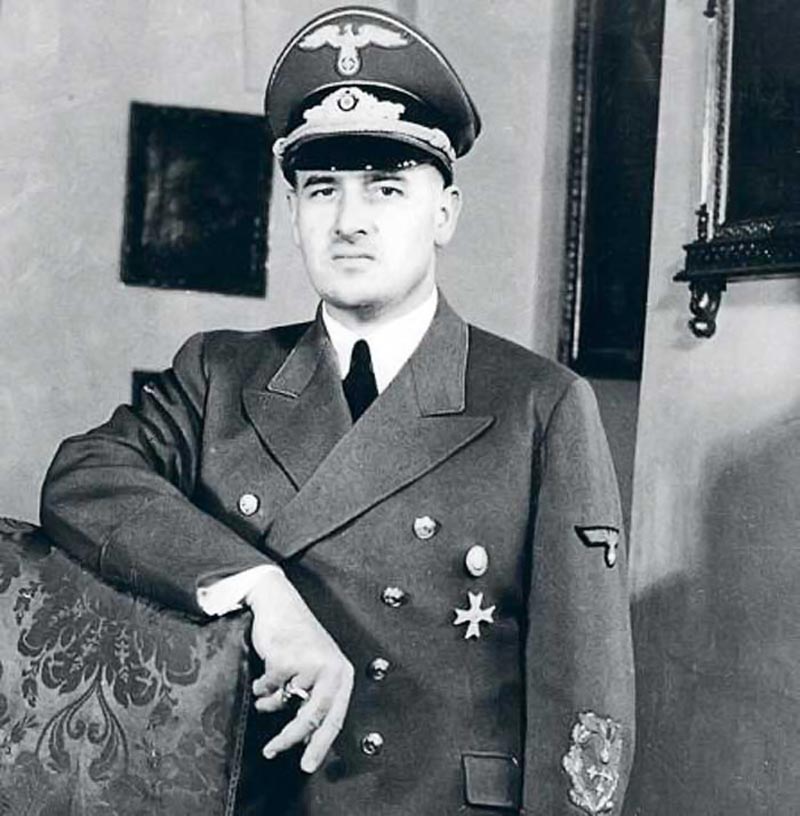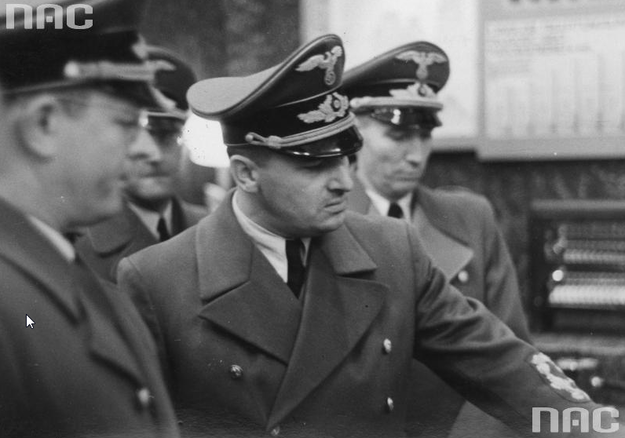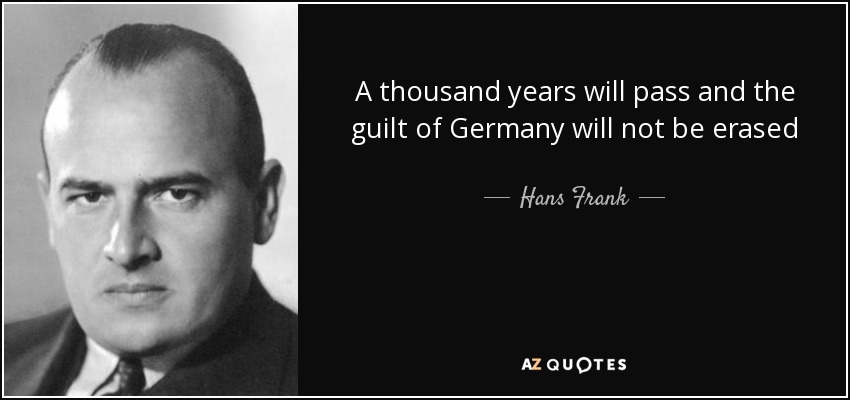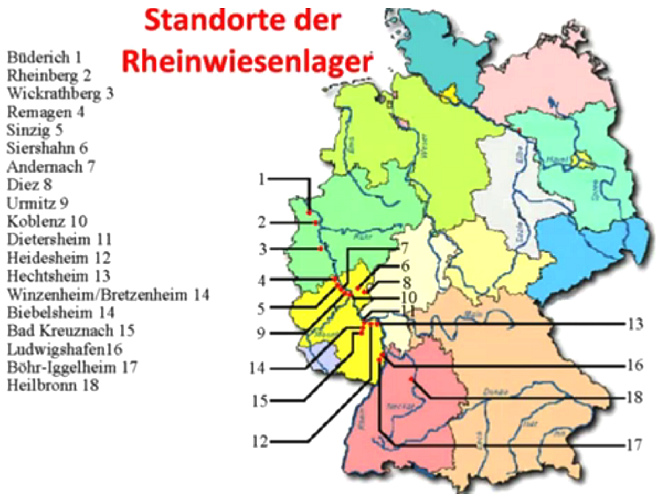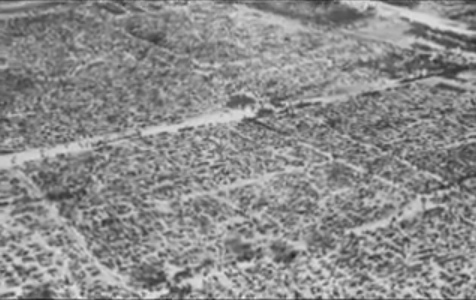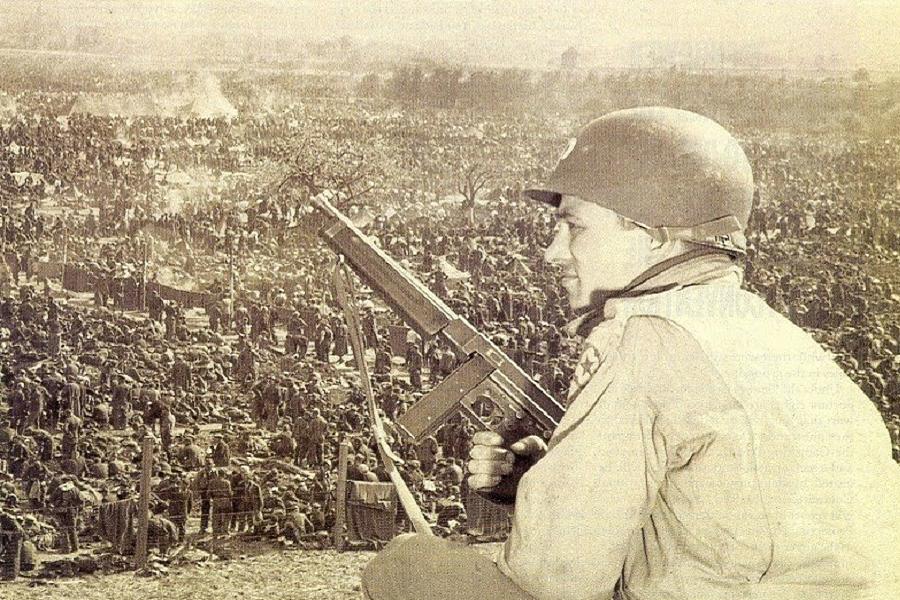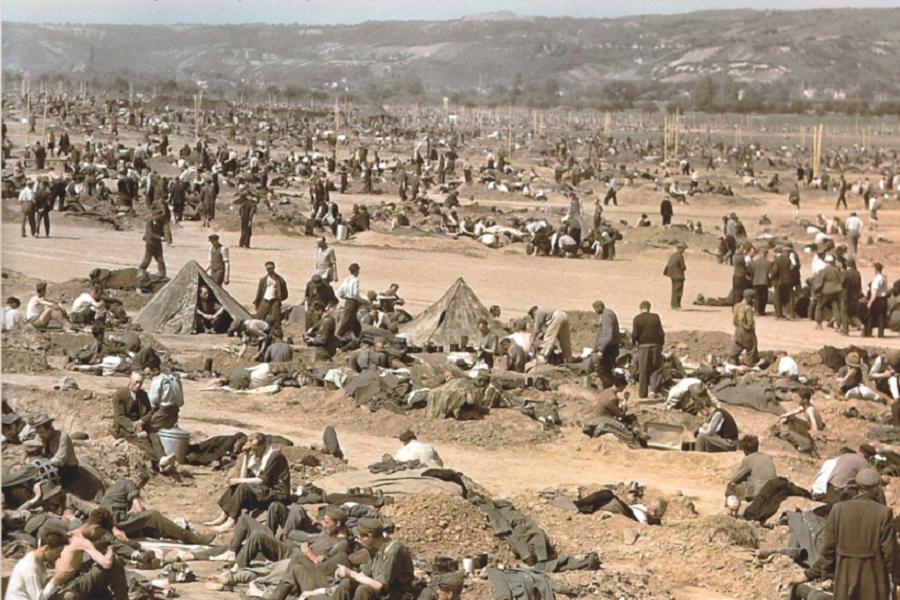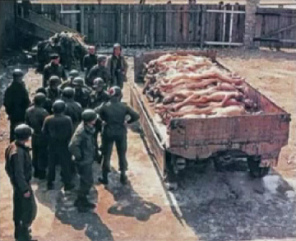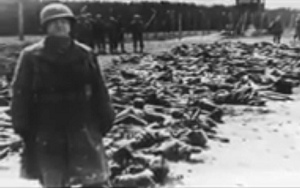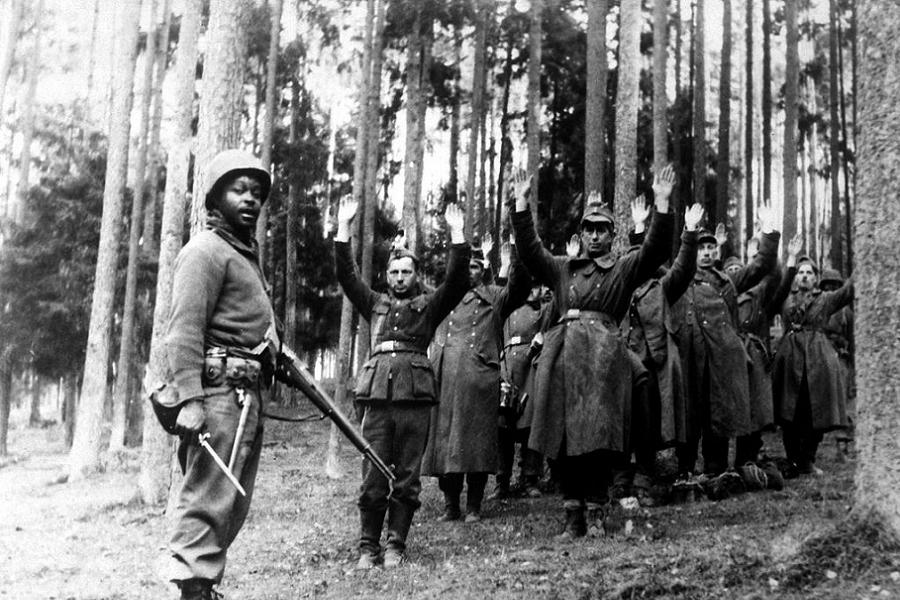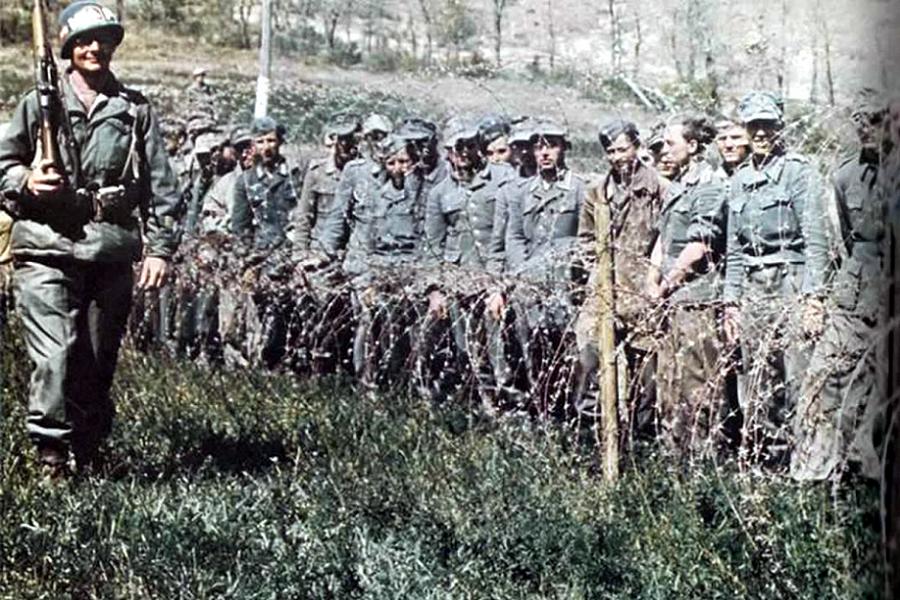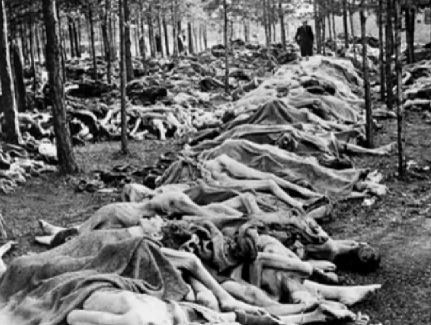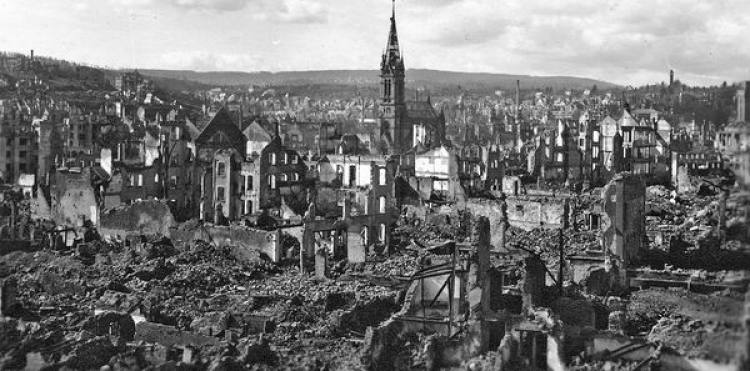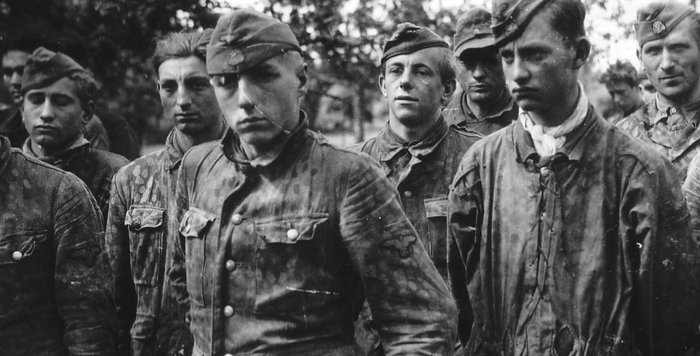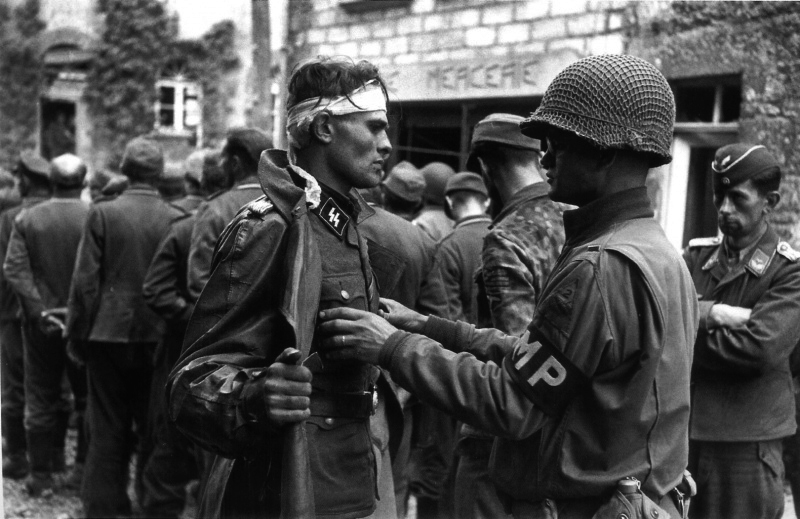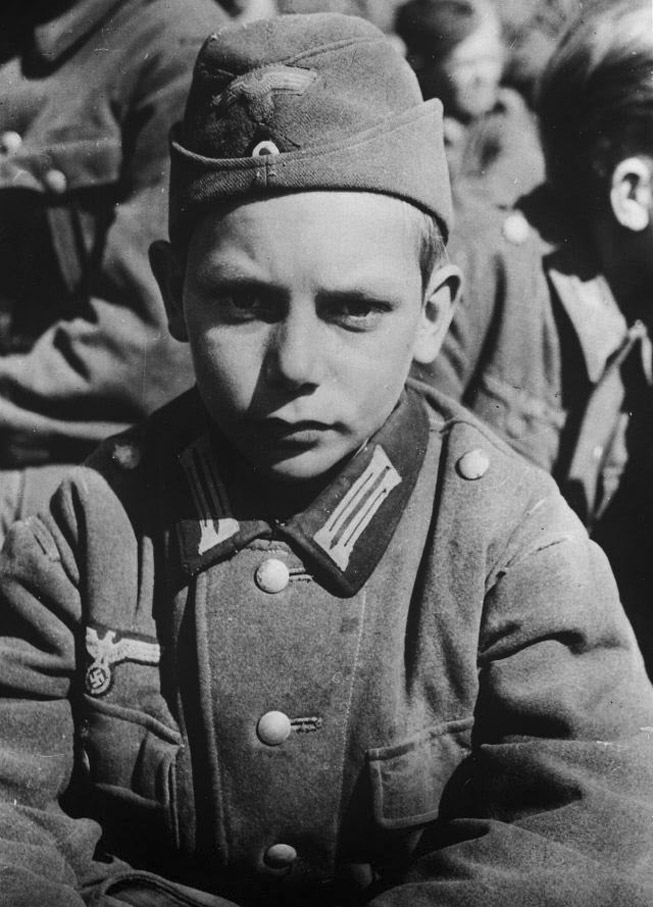| 盟軍總司令艾森豪故意餓死德軍戰俘80萬? |
| 送交者: Pascal 2018年05月17日10:53:47 於 [五 味 齋] 發送悄悄話 |
|
是你不仁在先,就別怪我不義在後; Vom Triumph des Willens bis zur Zerstörung von Körper und Geist 從意志的勝利走向身心的毀滅 —— 全民深入普及七十三年之前美利堅五星上將艾森豪威爾如何處理 久經戰火歷練、德意志國家社會主義工人黨黨中央宣傳部餵奶餵成狼崽、 洗腦洗至腦殘、第三帝國整整一代死忠我的元首精壯男子的 戰略設計挖坑、千年奠基考量: 盟軍最高指揮官艾總故意活活 餓死 渴死 曬死 病死 德軍希粉80萬?
Gubernator Hans Frank (drugi z lewej) w towarzystwie niemieckich funkcjonariuszy zwiedza zakład przemysłowy w Generalnej Guberni
Unusual Hitler photo from 1933, with Hans Frank
A thousand years will pass and the guilt of Germany will not be erased. 千年易過,納粹的罪孽難消。 —— 我的元首私人律師 Hans Michael Frank ( 23 May 1900 – 16 October 1946 ) A thousand years will pass and the guilt of Germany will not be erased. 千年易過,納粹的罪孽難消。 —— 我的元首私人律師 Hans Michael Frank ( 23 May 1900 – 16 October 1946 ) Ike and the Disappearing Atrocities 艾克與消失不見停戰後虐俘暴行
By STEPHEN E. AMBROSE ( January 10, 1936 – October 13, 2002,《 兄弟連 》作者,年僅 66 歲)
The New York Times Archives 1991 時間: 1945年4月 —— 1945年9月 地點:
名稱:The Rheinwiesenlager ( Rhine meadow camps ) 萊茵河露天戰俘大營 關押人數: 二至三百萬 德軍戰俘死亡人數: 美方: 3,000 - 10,000; 本書作者:“受害者的數量無疑超過80萬, 幾乎可以肯定超過90萬,可能超過100萬” Seldom has the publication of a historical monograph on a subject ordinarily of interest only to a few specialists -- the treatment of prisoners of war -- received so much attention or excited so much anger as James Bacque's "Other Losses." Published in 1989 in Canada, it was the subject of a cover story in the popular Canadian magazine Saturday Night, of a British Broadcasting Corporation documentary, of two German television documentaries and of a coming Canadian Broadcasting Corporation documentary. (The Canadian book, I should say immediately, carries a jacket blurb from me that was taken out of context and used without permission.) It has been discussed on American television, in Time magazine and in many other news media outlets. In its German edition, it was a runaway best seller. The British edition elicited major reviews in The Times Literary Supplement and elsewhere. Prima Publishing of California intends to publish the book in May, which could fan the flames in the United States. The reason for the notoriety is the author's conclusion that Gen. Dwight D. Eisenhower, as head of the American occupation of Germany in 1945, deliberately starved to death German prisoners of war in staggering numbers. Mr. Bacque charges that "the victims undoubtedly number over 800,000, almost certainly over 900,000 and quite likely over a million. Their deaths were knowingly caused by army officers who had sufficient resources to keep the prisoners alive." 谷歌同學譯文: 很少有關於通常只對少數專家感興趣的主題的歷史專着的出版 - 對戰 俘的待遇 - 如詹姆斯·巴克的“其他損失”那樣受到如此多的關注或 興奮。 1989年在加拿大出版,它是加拿大流行雜誌“星期六之夜”, 英國廣播公司紀錄片,兩部德國電視紀錄片和即將舉行的加拿大廣播 公司紀錄片的封面故事。 (我應該立即說,這本加拿大書籍帶有一件 夾克,從我的背景中取出,未經允許而使用。)美國電視台,時代雜 志和許多其他新聞媒體已經討論過這個問題。在德國版本中,它是一 款失控的暢銷書。英國版引起了“泰晤士報文學增刊”和其他地方的 重要評論。加利福尼亞州的普瑞瑪出版公司打算在5月份出版這本書, 這可能會在美國掀起火花。 臭名昭着的原因是作者的結論是,德懷特·D·艾森豪威爾將軍作為 美國在1945年占領德國的領導人,故意以驚人的數字餓死德國戰俘。 巴克先生指出,“受害者的數量無疑超過80萬,幾乎可以肯定超過 90萬,可能超過100萬,他們的死亡故意造成了有足夠資源讓囚犯活 着的軍官。” 根據巴克先生的說法,艾森豪威爾的方法很簡單:他將囚犯的名稱 從“日內瓦公約”要求的“戰俘”(POW)改為與美國地理標誌相同 的口糧給予“解除敵人部隊“(DEF),這讓他可以減少他們的飢餓 度。巴克先生說,D.E.F.也被剝奪了醫療用品和住房。他們死了數十 萬。他們的死亡被軍隊記錄所掩蓋,將其列為“其他損失”,顯示每 周手頭囚犯總數,出院人數等等。 因此,巴克克先生因發現這起令人髮指的罪行而感到憤怒,他在一次 電話採訪中引用了他的話:“美國人應該取下艾森豪威爾的每一尊雕 像,以及他的每一張照片,除了說,'這是一個做了非常邪惡的事情, 我們感到羞愧的人。' “問題立即出現。如果有一百萬人死亡,屍體 在哪裡?艾森豪威爾是否擁有如此巨大的權力,以至於他可以大規模 地挨餓並保守秘密?這些難民營,特別是萊茵河沿岸的過境營,是艾 森豪威爾政策的結果,還是1945年春季和夏季歐洲盛行的混亂局面的 結果,無疑是苦難嗎? 先前沒有歷史研究或寫作經驗的加拿大小說家巴克先生在他的介紹中 說:“毫無疑問,許多學者都會在本書中找到缺點,我只歡迎他們的 批評和進一步的研究,這可能有助於經過漫長的謊言之後,讓我們重 拾真相。“去年12月,新奧爾良大學的艾森豪威爾中心邀請了這一時 期的一些頂尖專家對這些指控進行審查。包括我在內的與會者計劃以 書面形式發表論文。 我們的第一個結論是,巴克先生已經做出了重大的歷史發現。 1945 年春季和夏季,德國囚犯普遍遭到虐待。由於糧食配給不足和醫療保 健不足,男子遭到毆打,被拒絕供水,被迫在沒有住所的露營地生活。 他們的郵件被扣留。在某些情況下,囚犯為了對付他們的飢餓,製造 了一種水和草的“湯”。男人不必要地和不可原諒地死去了。必須面 對這一點,而且巴克先生的信譽是他迫使我們這樣做。 我們的第二個結論是,當學者進行必要的研究時,他們會發現巴克先 生的工作更糟糕,而不是毫無價值。這是嚴重的 - 不可否認,它的最 基本的方面是有缺陷的。 Bacque先生濫用文件;他誤讀了文件;他忽 略了相反的證據;他的統計方法是絕望的妥協;他沒有試圖看到他在與 更廣泛情況的關係中收集的證據;他沒有試圖去看比較的背景;他把話 放在主要來源的口中;他忽視了決定性地處理他的中央指責的現成和 絕對重要的來源;而且,由於這些和其他缺點,他得出結論並提出明顯 荒謬的指控。 然而,除了對Bacque先生的調查結果的評估之外,這次會議 - 連同 這本書本身 - 引發了一個更大的問題:那些不是專家的讀者如何判 斷一項新的,令人吃驚,甚至是令人髮指的索賠的工作?如果沒有知 識或時間進行調查,他們如何知道作者是否在“長夜謊言之後”終於 披露了真相,或者只是誤導了一個不知情的公眾?
Piles of dead bodies of carectic humans, according to the "Americans" these are dead Jews, but according to new research these are dead German soldiers 1945 至於巴克先生的說法,最直接的問題是艾森豪威爾的動機:艾克為什 麼要做這樣的事情?巴克先生回答說艾森豪威爾恨德國人。現在絕對 是真的,在1945年春天,艾森豪威爾對德國人的憤怒非常大。他從未 試圖掩飾這些感受:1948年出版的“歐洲十字軍東征”中寫道:“在 我個人的反應中,隨着衝突月份的磨合,我對德國人的態度越來越強 烈。”他表示,他曾向死者的妻子和母親簽署了數萬封吊letters信, 他寫道:“我知道沒有更有效的手段發展對侵略戰爭負責者的不朽仇 恨,而不是承擔義務試圖向其遺失的家屬表示同情。“集中營的暴露 增加了他的情緒。 艾森豪威爾是熱衷於脫癮的支持者,但並不是因為他恨德國人或相信 集體有罪。相反,他相信有德國人致力於民主,而占領的任務就是找 到他們並將他們帶到前台。在1945年法蘭克福的一次演講中,他宣 稱:“這個職業的成敗將由50年後的德國人的性格來判斷,當他們開 始實行自己的民主時,讓德國人有機會這樣做,及時。“這聽起來並 不像一個同時因飢餓的一百萬年輕德國人而導致死亡的人。 巴克先生完全誤解了艾森豪威爾在占領中的立場和活動。他對艾森豪 威爾的每一項決策都承擔全部責任,從不承認他有上級從他接受政策 指令和命令 - 特別是陸軍參謀長;歐洲諮詢委員會以英國,蘇聯和美 國政府的名義和權力行事;參謀長聯席會議;參謀長聯席會議,即美國 聯合參謀長和英國參謀長聯席會議;和英美政府首腦。新奧爾良外交 背景會議報告由渥太華大學的布賴恩維拉指出,艾森豪威爾上級的政 策是要讓德國人認識到他們失敗的事實,他們已經把自己帶到了自己 身上,用其他方式來“對待”粗糙。“反向化是該政策的一個方面。 另一個原因是,與德國平民相比,德國囚犯得不到比解放國平民或流 離失所者(D.P.)更高的水平。 對於巴克先生的指控來說,核心主張是他認為1945年歐洲沒有糧食 短缺。他指出德國的倉庫里充滿了食物。他說紅十字會有食物。他 最令人印象深刻的證據之一是,一輛來自日內瓦的火車上裝載着紅 十字會送給德國囚犯的食品包被迫退去。 這令人震驚 - 食物可用,男人餓了,美國軍官下令列車返回日內瓦。 但是有一個原因:盟國政府已經決定,紅十字會的食品包將用於養活 流離失所者,其中德國有200多萬流離失所者,艾森豪威爾對這一政 策的命令是明確的。所以D.P.拿到了那些食品包裹。在一個飢餓的世 界裡,必須要確定糧食的優先次序是無法描述的痛苦,但是必須完成, 誰能夠與這個決定爭論呢? 阿拉巴馬大學伯明翰分校的James Tent在他關於德國食物形勢的會議 報告中說,毫無疑問,這是嚴重的短缺。不過,正如泰恩特先生指出 的那樣,倉庫里儲存的食物沒有分發給靠近飢餓飲食的囚犯。再次, 這是令人震驚的,直到原因被指出。盟國政府在1945年至1846年的冬 天害怕饑荒,他們正在儲存糧食。即使有儲備,他們也幾乎沒有過冬, 而且在歐洲糧食短缺被克服的三年之前。 巴克先生的神話是艾森豪威爾的噩夢。沒有食物短缺?艾森豪威爾在 1945年2月寫下了參謀長喬治馬歇爾將軍的信件:“我非常關心糧食 狀況......我們現在在歐洲大陸沒有儲備供公民使用。” 1945年4月25日,艾森豪威爾給聯合參謀部寫信說:“除非立即採取 措施儘可能充分發展糧食資源,以便為德國人提供最低限度的需求, 普遍的混亂,飢餓和在即將到來的冬季,疾病是不可避免的。” 這些 - 以及許多類似的信息 - 在投降之前就已經結束了。 5月的第 一周后,艾森豪威爾所有關於他被要求在被占領的德國供養多少人的 計算變得非常不足。由於兩個原因,他嚴重低估了。首先,德國士兵 向西方盟軍投降的數量遠遠超過了預期的數量(超過500萬,而不是 預期的300萬),因為德國士兵越過易北河衝上了俄國人。對於德國 平民也是如此 - 從東到西有數百萬人逃離,共計約1300萬人,並成 為艾森豪威爾的責任。其次,解放奴隸的數量遠超預期,超過200萬。 總之,艾森豪威爾甚至在得知德國有超過1700萬人在他們的食物之外 餵食之前就面臨着短缺。 沒有食物短缺?這是1945年7月德國軍事總督的報告:“西德的整個 食品形勢可能是最嚴重的占領問題,西部地區的平均食物消費量現在 比普遍接受的生存水平低大約三分之一水平。” 9月份的報告宣稱, “來自本土的食物不能滿足目前普通消費者的日常口糧水平,即每天 1,550卡路里。” 巴克先生說,囚犯每天接受1,550卡路里的熱量,他認為這樣的口糧 意味着飢餓緩慢。他顯然從來沒有在德國或在解放國家看過平民得到 什麼。在1945年的巴黎,平民的卡路里水平為1550。在配給持續的英 國,這只是略高一點。在俄羅斯,配給量還在持續下降。如上所述, 德國平民的官方配給量為1550,但通常沒有達到。在1945年夏天的 維也納,官方配給量有時會下降到500。 有這樣的常識。任何在1945年夏天在歐洲的人都會大吃一驚,聽說 沒有糧食短缺。 根據巴克先生的說法,艾森豪威爾私下秘密地以險惡的意圖,將投降 的德國士兵從戰俘身份轉變為解除武裝的敵軍。事實上,指定的改變 是一個政策問題。這個決定不是由艾森豪威爾做出,而是由他的上司, 特別是歐洲諮詢委員會做出的。也沒有人企圖保密。所有涉及英國, 俄羅斯和美國政府的權力的人都是這樣做的,他們對地位變化的原因 非常直截了當。 根據巴克先生的說法,艾森豪威爾親自秘密地,以險惡的意圖,將投 降的德國士兵從戰俘身份轉變為解除武裝的敵軍。事實上,指定的改 變是一個政策問題。這個決定不是由艾森豪威爾做出,而是由他的上 司,特別是歐洲諮詢委員會做出的。也沒有人企圖保密。所有涉及英 國,俄羅斯和美國政府的權力的人都是這樣做的,他們對地位變化的 原因非常直截了當。 發生的事情很簡單:盟軍無法按照“日內瓦公約”的要求,為數百萬 與他們自己的部隊一起吃飯的德國囚犯提供食物。即使有了食物,盟 國也不會為比德國平民更高的水平餵養德國囚犯,更不用說西歐解放 國的平民了,更不用說流離失所者了。人。但是美國和其他盟國已經 簽署了具有條約效力的日內瓦公約。他們不希望違反它,所以他們使 用了新的名稱“解除武裝的敵軍”。向現場指揮官發出的命令很簡單: 不要給德意志聯邦共和國比德國平民更高的食物。
An American soldier and liberated prisoners of the Mauthausen concentration camp. Austria, May 1945. —US Holocaust Memorial Museum
Female German Luftwaffe POWs listen to a comrade playing the harmonica at Camp Vilvoorde (June, 1945). The camp was managed by British forces of the 21st Army Group and housed over 12,000 Axis POWs, both men and women.
British Auxiliary Territorial Service Lance Corporal Jean Burck of New Malden, Surrey, England speaks to a group of female German POWs at Camp Vilvoorde.
Three Blitzmädel at the moment of capture by American troops in 1945 Note the weapons cases in the background
SS women camp guards are paraded for work in clearing the dead. The women include Hildegard Kanbach (first from left) , Irene Haschke (centre, third from right), the Head Wardress, Elisabeth...
.. Youth boy (also seen above in group photo), a mere 13 years old when photographed here after being captured by the American war machine. May 1945 .
High-ranking U.S. Army officers inspect the newly liberated Ohrdruf concentration camp.
關於Bacque先生的另一個結論,他通過一個分析系統達到了他100萬 人死亡的聳人聽聞的數字,幾乎所有試圖檢查他的統計數字和方法的 人都被困住了。由於店員打字錯誤,他確實犯了一個錯誤。他在陸軍 醫療報告中看到了7萬名囚犯的數字,然後根據這個數字計算了美國人 手中所有囚犯的總死亡率,並在報告中提到了21,000人死亡。也就是 說,他得出了他最基本的結論,即所有難民營的死亡率為30%,將 21,000人的死亡人數除以7萬名囚犯。然而,70,000的數字應該高出 10倍。文件中的所有其他數字清楚地表明正確的囚犯人數是700,000。 這會使死亡率不是30%,而是3%。 事實上,正如陸軍軍事史中心部的阿爾伯特考德里向會議報告,德國 囚犯的整體死亡率為1%。考德里先生的結論得到另一位會議參與者 德國弗萊堡軍事歷史辦公室的主要負責人Rudeiger Overmans的強烈 支持,他正在撰寫德國官方的戰爭歷史的最後一卷,即所有原因造成 的死亡總數在美國人手中的德國囚犯不能超過56,000人。 最後,美國陸軍劇院教務長的每周報告中有一列題為“其他損失”的 數字。在這裡,巴克先生發現他的“失蹤的百萬人”。 “其他損失”是什麼?巴克先生採訪了1945年退伍的陸軍上校菲利 普·勞本,他是艾森豪威爾總部德國事務部的成員。他寫道,勞本 上校告訴他“其他損失”意味着“死亡和逃跑”。 “有多少逃跑?”巴克先生問道。 “非常非常小,”勞本上校回答。巴克先生說,他們不到百分之一 的百分之一,沒有解釋他是如何達到這樣一個數字的。 英國廣播公司關於“其他損失”的紀錄片製片人尼爾卡梅隆在會議 上告訴記者,他從巴克先生那裡獲得了採訪錄像帶。卡梅倫先生看 起來很清楚,巴克先生已經讓一位老人同意了巴克先生用過的話, 然後放在他的嘴裡。卡梅倫先生對勞本上校進行了自己的攝像採訪; 在其中,勞本上校表示,他被巴克先生誤導,並對“其他損失”一 詞的含義錯誤。 CNN的大衛霍金斯想要接受勞本上校的採訪。勞本上校在一封信中解 釋道:“我並不困難,我91歲,法定失明,我的記憶力已經降到一個 相當不可靠的程度,而且我正在接受正規的醫療護理。在我與巴克克 先生的交談中,經常提醒他,自1945年以來的40多年裡,我的記憶力 一直在惡化。 “巴克先生給我看的數字......在我看來,在考慮到轉移和排放之後, 除了死亡和逃跑以外,沒有什麼能夠彌補總數,即”其他損失“。我 誤解了。” 因此,Bacque先生唯一證明“其他損失”是死亡掩蓋期的指控有兩次 否定了Bacque先生堅持說的話。 那麼“其他損失”是什麼?在許多情況下,他們是從一個區域轉移 到另一個區域,這是由於各種原因定期完成的,沒有一個是陰險的, 並且都在每周報告的腳註中正確記錄。 但是在1945年8月的軍事總督報告中顯示了最多的“其他損失”。 (這些月度報告位於堪薩斯州阿比林艾森豪威爾圖書館,華盛頓國 家檔案館和其他地方;它們是占領各方面的基本資料來源,包括糧食 短缺和囚犯;巴克先生沒有引用它們,他沒有證據證明他們是這樣做 的。)8月份的報告列出了美軍撤出的解除武裝敵人的數量,以及那 些被轉移到英國和法國進行強迫勞動的人數。 報告還說:“另外一組663,576人被列為'其他損失',主要由 Volkssturm [人民民兵]成員發布,未經正式解除。” 看到這裡發生的事情幾乎沒有想象力。人民民兵包括年紀較大的男 子(60歲以下,主要是第一次世界大戰退伍軍人)和16歲或有時甚至 更少的男孩。美國警衛和營地當局告訴老人回家照顧他們的孫輩,男 孩們回家後回到學校。隨着Bacque先生忽略的其他區域的轉移,這些 人將所有“失蹤的百萬人”都計算在內。 簡而言之,Bacque先生在每次重大費用和幾乎所有的小費用上都是 錯誤的。艾森豪威爾不是希特勒,他沒有經營死亡營,德國囚犯沒 有死於數十萬人,1945年糧食嚴重短缺,對於“解除武裝的敵軍” 指定或關於專欄“其他損失”。巴克先生的“失蹤的萬人”是民兵 中的老男人和年輕男孩。 儘管如此,巴克克先生提出的觀點是無可辯駁的:一些美國的G.I. 和他們的軍官能夠像納粹一樣殘暴地行事。我們並沒有對美德的壟 斷。他質疑我們要重新提出這個問題,做所需的研究,以了解完整 的事實。對於這一貢獻,他值得感謝。但是,至於他如何提出他的 發現,我又轉向了阿爾伯特考德里:“作者有理由對他的成就感到 滿意,他沒有作為歷史學家的失敗聲望,'其他損失'只能增強他的 地位。一位小說家。” 最後還有更大的問題。它召開了專家會議來挑戰Bacque先生的指控。 個別學者猶豫不決,因為這樣做需要檢查他的研究 - 實際上是重寫 他的書。相反,他們中的許多人在英國,法國,德國和加拿大的評 論中表示,他們無法相信巴克克先生所說的關於艾森豪威爾的事實 是真實的,但他們不能反駁它。巴克先生擁有所有獎學金的工具;它 看起來令人印象深刻,甚至連學者也不例外。 在這種情況下,讀者要做什麼?我建議他或她相信常識。當面對大 屠殺未曾發生過的學校時,請問明顯的問題。如果答案不明確,則 收費尚未得到證實。在Bacque先生的案例中,有兩個這樣的問題: 屍體在哪裡?這本書是否符合我們對艾森豪威爾性格的描述,因為 我們從無數其他來源中了解到這一點?最終,在像這樣的情況下, 它通常是使我們最接近真相的明顯問題。 除了Stephen E. Ambrose之外,新奧爾良大學艾森豪威爾會議的 參與者還包括: 紐約州立大學的托馬斯·巴克,奧爾巴尼,中歐軍事史專家; 艾森豪威爾中心的Guenter Bischof,奧地利職業專家; 尼爾卡梅倫,BBC紀錄片“其他損失”的製作人; 陸軍軍事史中心部的Albert Cowdrey; 德國歷史研究所的Alex Frohn; 軍事歷史辦公室的軍事歷史學家Ruediger Overmans; 因斯布魯克大學的羅爾夫斯坦寧格,有關占領德國的兩卷歷史的 作者; 阿拉巴馬大學伯明翰大學的James Tent,“萊茵河任務”的作者; 渥太華大學的Brian Villa,“未經授權的行動:蒙巴頓和迪耶普 襲擊”的作者。 Eisenhower's method, according to Mr. Bacque, was simple: he changed the designation of the prisoners from "Prisoners of War" (P.O.W.), required by the Geneva Convention to be fed the same rations as American G.I.'s, to "Disarmed Enemy Forces" (D.E.F.), which allowed him to cut their rations to starvation level. Mr. Bacque says the D.E.F. were also denied medical supplies and shelter. They died by the hundreds of thousands. Their deaths were covered up on Army records by listing them as "other losses" on charts showing weekly totals of prisoners on hand, numbers discharged and so forth. So outraged is Mr. Bacque by his discovery of this heinous crime that he has been quoted in a wire service interview as saying Americans "should take down every statue of Eisenhower, and every photograph of him and annul his memory from American history as best they can, except to say, 'Here was a man who did very evil things that we're ashamed of.' " Questions immediately arise. If there were a million dead, where are the bodies? Did Eisenhower have such vast power that he could order starvation on a mass scale and keep it a secret? Was the undoubted suffering in the camps, especially the transit camps along the Rhine, the result of Eisenhower's policy or the result of the chaotic conditions that prevailed in Europe in the spring and summer of 1945? Mr. Bacque, a Canadian novelist with no previous historical research or writing experience, says in his introduction: "Doubtless many scholars will find faults in this book, which are only mine. I welcome their criticism and their further research, which may help to restore to us the truth after a long night of lies." Last December, the Eisenhower Center at the University of New Orleans invited some leading experts on the period to examine the charges. The conference participants, including me, plan to publish the papers in book form.
Our first conclusion was that Mr. Bacque had made a major historical discovery. There was widespread mistreatment of German prisoners in the spring and summer of 1945. Men were beaten, denied water, forced to live in open camps without shelter, given inadequate food rations and inadequate medical care. Their mail was withheld. In some cases prisoners made a "soup" of water and grass in order to deal with their hunger. Men did die needlessly and inexcusably. This must be confronted, and it is to Mr. Bacque's credit that he forces us to do so. Our second conclusion was that when scholars do the necessary research, they will find Mr. Bacque's work to be worse than worthless. It is seriously -- nay, spectacularly -- flawed in its most fundamental aspects. Mr. Bacque misuses documents; he misreads documents; he ignores contrary evidence; his statistical methodology is hopelessly compromised; he makes no attempt to see the evidence he has gathered in its relationship to the broader situation; he makes no attempt to look at comparative contexts; he puts words into the mouth of his principal source; he ignores a readily available and absolutely critical source that decisively deals with his central accusation; and, as a consequence of these and other shortcomings, he reaches conclusions and makes charges that are demonstrably absurd. Apart from its assessment of Mr. Bacque's findings, however, the conference -- along with the book itself -- raises a larger issue: how are readers who are not experts to judge a work that makes new, startling, indeed outrageous, claims? Without the knowledge or the time to investigate, how are they to know if an author has finally revealed the truth "after a long night of lies," or is simply misleading an unwary public? As for Mr. Bacque's claims, the most immediate question is that of Eisenhower's motive: why on earth would Ike do such a thing? Mr. Bacque answers that Eisenhower hated the Germans. Now it is absolutely true that in the spring of 1945, Eisenhower's anger at the Germans was very great. He never attempted to hide these feelings: in "Crusade in Europe," published in 1948, he wrote, "In my personal reactions, as the months of conflict wore on, I grew constantly more bitter against the Germans." He relates that he signed tens of thousands of letters of condolence to the wives and mothers of his fallen men, and he wrote, "I know of no more effective means of developing an undying hatred of those responsible for aggressive war than to assume the obligation of attempting to express sympathy to families bereaved by it." The uncovering of the concentration camps added to his emotion. Eisenhower was an enthusiastic supporter of denazification, but not because he hated the Germans or believed in collective guilt. To the contrary, he believed that there were Germans who were committed to democracy and that the task of the occupation was to find them and bring them to the fore. In a speech in Frankfurt in 1945, he declared: "The success or failure of this occupation will be judged by the character of the Germans 50 years from now. Proof will come when they begin to run a democracy of their own and we are going to give the Germans a chance to do that, in time." This does not sound like a man who simultaneously was directing the death by starvation of one million young Germans. Mr. Bacque completely misunderstands Eisenhower's position and activity in the occupation. He puts full responsibility on Eisenhower for every policy decision, never recognizing that he had superiors from whom he took policy directives and orders -- specifically, the Army Chief of Staff; the European Advisory Commission, acting in the name and with the authority of the British, Soviet and American Governments; the Joint Chiefs of Staff; the Combined Chiefs of Staff, that is, the American Joint Chiefs and the British Chiefs of Staff; and the heads of the British and American Governments. The report at the New Orleans conference on the diplomatic background, by Brian Villa of the University of Ottawa, noted that the policy of Eisenhower's superiors was to impress upon the Germans the fact of their defeat, the fact that they had brought it on themselves and in other ways to "treat 'em rough." Denazification was one aspect of that policy. Another was that German prisoners would not be fed at a higher level than German civilians, than the civilians of the liberated nations, or than the displaced persons (D.P.'s). An assertion that is central to Mr. Bacque's accusation is his contention that there was no European food shortage in 1945. He points to warehouses in Germany full of food. He says that the Red Cross had food available. One of his most damning pieces of evidence is that a train from Geneva loaded with food parcels sent by the Red Cross to feed German prisoners was forced to turn back. This is shocking -- food was available, men were hungry and American officers ordered the train to return to Geneva. But there was a reason: the Allied Governments had decided that Red Cross food parcels would be used to feed displaced persons, of whom there were more than two million in Germany, and the orders to Eisenhower on this policy were explicit. So D.P.'s got those food parcels. It is painful beyond description to have to set food priorities in a hungry world, but it had to be done, and who could argue with the decision? In his conference report on the food situation in Germany, James Tent of the University of Alabama-Birmingham says there was no question that there were severe shortages. Still, as Mr. Tent points out, there was food stocked in warehouses that was not distributed to prisoners living on a near-starvation diet. Again, this is shocking, until the reason is noted. The Allied Governments were fearful of famine in the winter of 1945-46, and they were stockpiling food. Even with the reserves, they barely got through the winter, and it was three years before the European food shortage was overcome. Mr. Bacque's myth was Eisenhower's nightmare. No food shortage? Eisenhower wrote the Chief of Staff, Gen. George C. Marshall, in February 1945: "I am very much concerned about the food situation. . . . We now have no reserves on the Continent of supplies for the civil population." And here is Eisenhower writing to the Combined Chiefs of Staff on April 25, 1945: "Unless immediate steps are taken to develop to the fullest extent possible the food resources in order to provide the minimum wants of the German population, widespread chaos, starvation and disease are inevitable during the coming winter." These -- and many, many similar messages -- went out before the surrender. After the first week of May, all of Eisenhower's calculations as to how many people he would be required to feed in occupied Germany became woefully inadequate. He had badly underestimated, for two reasons. First, the number of German soldiers surrendering to the Western Allies far exceeded what was expected (more than five million, instead of the anticipated three million), because of the onrush of German soldiers across the Elbe River to escape the Russians. So too with German civilians -- there were millions fleeing from east to west, about 13 million altogether, and they became Eisenhower's responsibility. Second, the number of slave laborers liberated was much greater than anticipated, by more than two million. In short, Eisenhower faced shortages even before he learned that there were 17 million more people to feed in Germany than he had expected. No food shortage? This is the report of the Military Governor for Germany in July 1945: "The food situation throughout Western Germany is perhaps the most serious problem of the occupation. The average food consumption in the Western Zones is now about one- third below the generally accepted subsistence level." The September report declares, "Food from indigenous sources was not available to meet the present authorized ration level for the normal consumer, of 1,550 calories per day." Mr. Bacque says that the prisoners were receiving 1,550 calories a day, and he contends that such a ration means slow starvation. He apparently never looked at what civilians were getting, in Germany or in the liberated countries. In Paris in 1945, the calorie level was 1,550 for civilians. It was only slightly higher in Britain, where rationing continued. It was much lower in Russia, where rationing also continued. As noted, the official ration for German civilians was 1,550, but often not met. In Vienna in the summer of 1945 the official ration sometimes fell to 500. There is such a thing as common sense. Anyone who was in Europe in the summer of 1945 would be flabbergasted to hear that there was no food shortage. According to Mr. Bacque, Eisenhower personally, secretly, and with sinister intent changed the status of surrendered German soldiers from prisoners of war to disarmed enemy forces. In fact, the change in designation was a policy matter. The decision was made not by Eisenhower but by his superiors, specifically by the European Advisory Commission. Nor was any attempt made to keep it secret. All those involved acted with the authority of the British, Russian and American Governments, and they were perfectly straightforward about the reason for the change in status. What happened is simple enough: the Allies could not afford to feed the millions of German prisoners at the same level at which they were feeding their own troops, as required by the Geneva Convention. Even had the food been available, the Allies were not going to feed German prisoners at a higher level than they were able to feed German civilians, not to mention the civilians of the liberated countries of Western Europe, and not to mention as well the displaced persons. But the United States and other Allied nations had signed the Geneva Convention, which had the force of a treaty. They did not wish to violate it, so they used the new designation of "Disarmed Enemy Forces." The orders to the field commanders were straightforward: do not feed the D.E.F.'s at a higher scale than German civilians. With regard to another of Mr. Bacque's conclusions, he arrives at his sensational figure of one million dead through a system of analysis that has left almost everyone who has tried to check his statistics and methods befuddled. He did make one mistake because of a typing error by a clerk. He saw a figure of 70,000 prisoners in an Army medical report and then calculated the total death rate for all prisoners in American hands on the basis of that number and the 21,000 deaths also mentioned in the report. That is, he arrived at his most basic conclusion, a death rate in all camps of 30 percent, by dividing the 21,000 deaths by the 70,000 prisoners. However, the 70,000 figure should have been 10 times higher. All other figures in the document make it clear that the correct number of prisoners was 700,000. This would make the death rate not 30 percent but 3 percent. In fact, as Albert Cowdrey of the Department of the Army's Center of Military History reported to the conference, the overall death rate among German prisoners was 1 percent. Mr. Cowdrey's conclusion, strongly supported by another conference participant, Maj. Ruediger Overmans of the German Office of Military History in Freiburg (who is writing the final volume of the official German history of the war), is that the total death by all causes of German prisoners in American hands could not have been greater than 56,000. Finally, there is the matter of the column of figures in the weekly reports of the United States Army Theater Provost Marshal entitled "Other Losses." It is here that Mr. Bacque finds his "missing million." What were the "other losses"? Mr. Bacque interviewed Philip S. Lauben, a retired Army colonel who was a member of the German Affairs Branch of Eisenhower's headquarters in 1945. He writes that Colonel Lauben told him "other losses" meant "deaths and escapes." "How many escapes?" Mr. Bacque asked. "Very, very minor," Colonel Lauben replied. Mr. Bacque says they were less than one-tenth of 1 percent, with no explanation of how he arrived at such a figure. Neil Cameron, the producer of the BBC documentary about "Other Losses," told the conference that he had obtained from Mr. Bacque the tape of the interview. It seemed clear to Mr. Cameron that Mr. Bacque had got an old man to agree with words that Mr. Bacque used and then put in his mouth. Mr. Cameron did his own on-camera interview with Colonel Lauben; in it, Colonel Lauben said he was misled by Mr. Bacque and was wrong about the meaning of the term "other losses." David Hawkins of CNN wanted to do an interview with Colonel Lauben. Colonel Lauben turned him down, explaining in a letter: "I'm not being difficult. I am 91 years old, legally blind, and my memory has lapsed to a point where it is quite unreliable. Furthermore I am under regular medical care. Often during my talk with Mr. Bacque I reminded him that my memory had deteriorated badly during the 40 odd years since 1945. "Mr. Bacque read to me figures. . . . It seemed to me that, after accounting for transfers and discharges, there was nothing left to make up the grand total except deaths and escapes, i.e., the term 'Other Losses.' I was mistaken." Thus, Mr. Bacque's only witness for the charge that "other losses" was a cover-up term for deaths has twice repudiated what Mr. Bacque maintains that he said. What then were the "other losses"? In many cases they were transfers from one zone to another, something that was regularly done for a variety of reasons, none of them sinister, and all duly recorded in footnotes on the weekly reports. But the greatest number of "other losses" is revealed in the August 1945 Report of the Military Governor. (These monthly reports are in the Eisenhower Library in Abilene, Kan., in the National Archives in Washington and elsewhere; they are a basic source on every aspect of the occupation, including food shortages and prisoners; Mr. Bacque did not cite them and there is no evidence he examined them.) The August report lists the numbers of disarmed enemy forces discharged by American forces and those transferred to the British and French for forced labor. The report continues: "An additional group of 663,576 are listed as 'other losses,' consisting largely of members of the Volkssturm [ People's Militia ] released without formal discharge." It takes little imagination to see what happened here. The People's Militia consisted of older men (up to 60 years of age, mainly World War I veterans) and boys of 16 or sometimes less. American guards and camp authorities told the old men to go home and take care of their grandchildren, the boys to go home and return to school. Along with the transfers to other zones that Mr. Bacque ignores, these people account for all the "missing million." In short, Mr. Bacque is wrong on every major charge and nearly all his minor ones. Eisenhower was not a Hitler, he did not run death camps, German prisoners did not die by the hundreds of thousands, there was a severe food shortage in 1945, there was nothing sinister or secret about the "disarmed enemy forces" designation or about the column "other losses." Mr. Bacque's "missing million" were old men and young boys in the militia. Nevertheless, Mr. Bacque makes a point that is irrefutable: some American G.I.'s and their officers were capable of acting in almost as brutal a manner as the Nazis. We did not have a monopoly on virtue. He has challenged us to reopen the question, to do the research required, to get at the full truth. For that contribution, he deserves thanks. But as to how he presented his discovery, I turn again to Albert Cowdrey: "Surely the author has reason to be satisfied with his achievement. He has no reputation as a historian to lose, and 'Other Losses' can only enhance his standing as a writer of fiction." There remains, finally, the larger issue. It took a conference of experts to challenge Mr. Bacque's charges. Individual scholars have hesitated to take him on because to do so required checking through his research -- in effect, rewriting his book. Instead, many of them have said in their reviews in Britain, France, Germany and Canada that they cannot believe what Mr. Bacque says about Eisenhower is true, but they cannot disprove it. Mr. Bacque has all the paraphernalia of scholarship; it looks impressive enough to bamboozle even scholars. Under these circumstances, what is a lay reader to do? I suggest that he or she trust common sense. As when confronting the Holocaust-never-happened school, ask the obvious questions. If the answers aren't clear, the charges have not been proved. In Mr. Bacque's case, two such questions are: Where are the bodies? and Is this book consistent with our picture of Eisenhower's character as we know it from innumerable other sources? Ultimately, in cases such as this one, it is often the obvious questions that bring us closest to the truth. In addition to Stephen E. Ambrose, the participants at the Eisenhower conference at the University of New Orleans were: Thomas Barker of the State University of New York, Albany, a specialist on central European military history; Guenter Bischof of the Eisenhower Center, a specialist on Austria in the occupation; Neil Cameron, the producer of the BBC documentary on "Other Losses"; Albert Cowdrey of the Department of the Army's Center of Military History; Alex Frohn of the German Historical Institute; Ruediger Overmans of the Militargeschichtliches Forschungsamt (Office of Military History); Rolf Steininger of the University of Innsbruck, author of a two-volume history of the occupation of Germany; James Tent of the University of Alabama-Birmingham, author of "Mission on the Rhine"; Brian Villa of the University of Ottawa, author of "Unauthorized Action: Mountbatten and the Dieppe Raid." |
|
|
|
|
 |
 |
| 實用資訊 | |
|
|
|
|
| 一周點擊熱帖 | 更多>> |
|
|
|
| 一周回復熱帖 |
|
|
|
|
| 歷史上的今天:回復熱帖 |
| 2017: | 川粉們,大戲好看嗎?信寇米還是信總統 | |
| 2017: | 正在游歐: 荷蘭百合花/鬱金香花海,美 | |
| 2016: | 淡紫:看病小記(完) | |
| 2016: | 咚咚小同學,偉大領袖教導我門說:少談 | |
| 2015: | 雪山下的絳珠草:搭車記(二) | |
| 2015: | 慌慌,豆豆,堀內孝雄 愛しき日々 ,好 | |
| 2014: | 地里長了很多野菌,哪位知道這種鋪了mu | |
| 2014: | 中華就是漢族,其他僅是放棚戶區的點綴 | |
| 2013: | 兇手不是一般的可惡。先是看着失明,再 | |
| 2013: | 這個人的分析和我的感覺比較一致,雖然 | |




